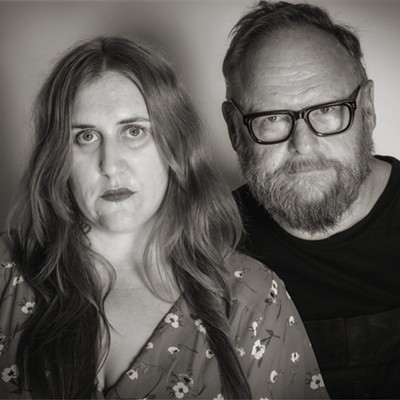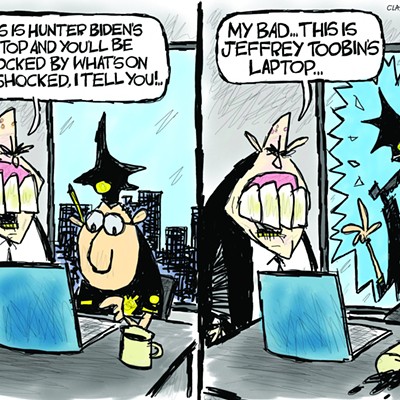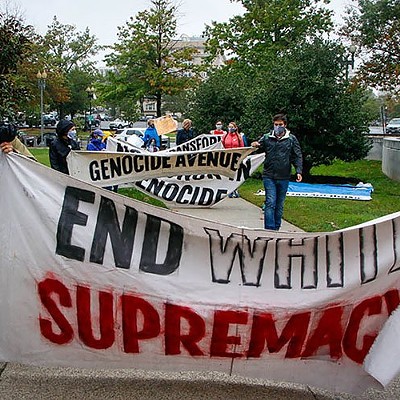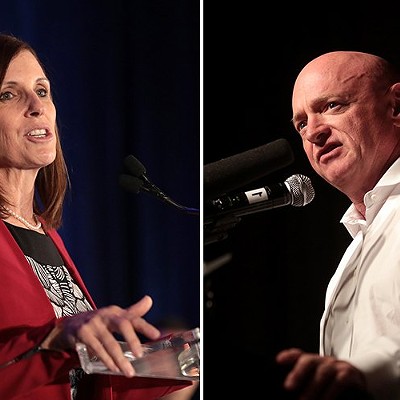One night when I was about 9, my parents sat me down in front of the record player and pulled out their ragged copy of the Woodstock concert.
"We think you're old enough now," my mother said, "to learn about this." My dad placed the needle on the record, and Country Joe and the Fish's "Fish Cheer" blared through the speakers. I was shocked. My mother pulled out a Time-Life book about the Vietnam War and the anti-war movement, and began explaining all of the pictures to me as my dad changed the song to Jimi Hendrix's version of "The Star-Spangled Banner."
"Now this," said my mother, "was an even bigger 'fuck you' to the government, and it was just music, just notes played on a guitar."
The political role of music is nothing new; ever since people could hammer out a few notes on a rock and caterwaul along with it, humans have been singing about political issues. But it wasn't until the heated movements of the 1960s and 1970s that music truly became a powerful force in the political sphere. The energy of rock and roll, the images, the enigmatic nature of rock stars, were used during the anti-war movement to get out a message: "You have rights, and you'd better damn well use them."
Throughout the 1980s and '90s, music never lost its political role, but it never regained the power or the unified message that it assaulted America with when Hendrix pulled a whammy bar on the national anthem. But as we approached this November's election, something interesting began happening: Bands began to get political again. Organizations like Rock the Vote and Plea for Peace were joined by organizations like Music for America. Musicians began pouring out of the woodwork to get across a unified message: "You have the right to vote," they are reminding us. "You'd better damn well use it."
"Music is our culture; we identify ourselves through a specific genre of music," said Faviola Augustin, the co-coordinator for Tucson's Rock the Vote chapter. "Basically (Rock the Vote), is a creative way of incorporating political and social issues and using it in a way where the youth can actually relate and be empowered."
Mike Park, the founder of the Plea for Peace Foundation, said at the tour's show in Tucson in June that it's hard for youth to get into power, but that music is a way to do that. "Music does everything--it's the highest of highs, the lowest of lows," said Park, who added that a nonpartisan event like the Plea for Peace tour, which focused on voter registration, can create "something deeper" than just party propaganda.
On the local level, the Tucson Suffragettes are trying to reach out to "virgin voters" through events like concerts and art exhibitions.
"Music is the universal gatherer. It's what we do in Tucson; most of the people in our group are artists and are a part of the music community, so what we do as people in our day-to-day, night-to-night life is get together and play music or listen to music," said Marianne Dissard, one of the Suffragettes. "There's that sense of community that's built around a live performance of one sort or another. And it's really strong here."
The interesting thing, though, is that while bands have stood up to support the drive to get people to vote, the music itself is not necessarily informed by politics.
"The bands that are going to be playing at our events are not political, per se; most of the venues kind of pick the bands that they feel comfortable working with, so we haven't gone looking for the political bands--none of them have political songs," said Dissard. "It's pretty rare; it's hard to write a political song or poem."
Right before the Plea for Peace tour came through Tucson, Tim Kasher--of Omaha band Cursive, which performed on the tour--made a good point: Just because a band is involved in a political engagement doesn't mean they are necessary political.
"We're absolutely not a political band and I don't see a time in the future that I'm gonna start writing politically charged music," said Kasher. "But I don't think it has to be necessary. We kind of feel like it's a privilege to use the platform that Cursive has made to give us a chance, for us personally, to do something for this year's election."
Most of the songs on The Future Soundtrack for America (Barsuk, 2004) are not directly political, but the list of involved musicians in itself sends a powerful message: It's not so much the words being sung, but who's singing them, and when and where they choose to sing them. The message is linked less to the actual music and more to the actual medium of music.
In the past few weeks, there have been more and more cases of this: Rolling Stone published an article Sept. 22 about MoveOn.org's Vote for Change tour, which paired numerous big-name acts together in simultaneous mini-tours in swing states, that quoted musicians like Alicia Keys, Eddie Vedder, Steve Earle, John Mellencamp, Mike Mills, Jeff Tweedy and Chuck D on their reasons for being involved with the tour. Not all of them write political songs, but they are more than willing to use their music to get out a political message.
Why, then, are bands not writing songs that are actually political?
"It goes hand in hand with what not only musicians, but people all across the country, have been feeling, which is disenfranchised and silenced," said Dissard. "Yes, it used to be that music and the arts were a lot more political, and it hasn't been the case, and we might be seeing a shift right now; I don't know how lasting it's gonna be."
Mark Matos, of Campo Bravo, one of the bands that played at the Suffragette's Vota Y Ya event in Nogales Oct. 2, put it this way: "Bob Dylan and Bob Marley were the best at it; wrote timeless stuff. I think your name has to be Bob if you have any hope of writing kick-ass political songs. My name's not Bob."
Augustin, of Rock the Vote, believes that there are plenty of politically charged songs out there; you just have to pay attention. "Artists are not specifically identified with one party or specific candidate, but they are touching on social issues. ... Music is so universal, everything's really intertwined with politics. If more conscious artists can do that, then they're doing a good thing."
What it may be, though, is that this time around, the whole point is not to just sing your protest; the point is to actually protest. We're not fighting for the right to vote; we have it, and all we need to do is use it.











